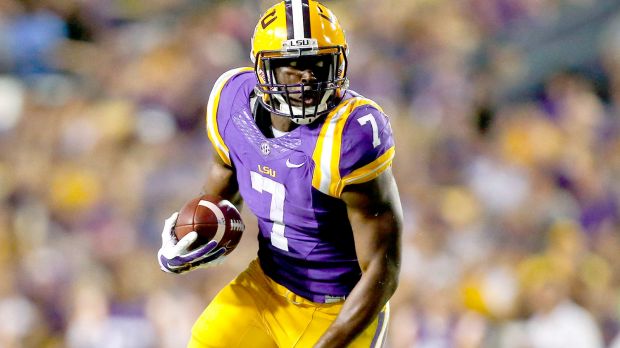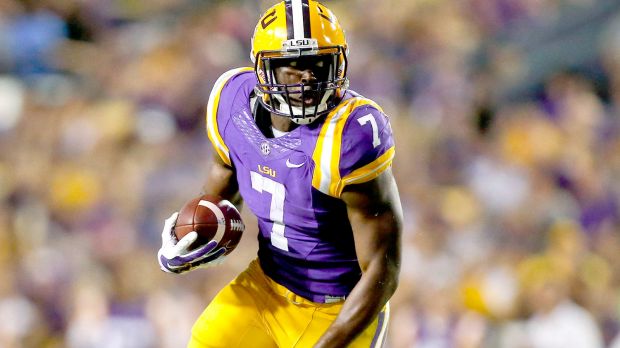
Leonard Fournette is an exceptional player and should be treated as such. (Photo courtesy of Fox Sports)
It happened again yesterday. In a game as brutal as football, we shouldn’t be surprised that it continues to happen.
Nick Chubb, the brilliant sophomore running back for the University of Georgia, was tackled on his first run against the Tennessee Volunteers, and his knee bent in a way that knees should never, ever bend. His face crumpled in pain and utter despair just as quickly as his body crumpled to the ground. Courtesy of the 423,801 reposts of the video on Twitter, everyone knows that Chubb probably shredded every ligament and will likely face a long, uphill battle if he ever wants to play football again, let alone reach his pre-injury skill level.
But much of the reaction on the internet was focused not on Chubb—a supreme talent in his own right, in fact a preseason Heisman Trophy favorite—but on LSU’s Leonard Fournette, another sophomore running back who has rattled off an almost unheard-of string of dominant performances over the past month. Based on scouts’ analysis, he could be a difference maker in the National Football League if he turned pro today. And every chronicle of his personality, including this feature by ESPN’s Ivan Maisel, paints a picture of a man who both looks and acts well beyond his years. For instance, he doesn’t drink or smoke, unusual among college athletes, and last year gave up fried foods.
Yet Leonard Fournette will not be able to make money from his football abilities until the 2017 NFL season. It seems unfair to force Fournette to put extra mileage on his legs without any return for his efforts, particularly when a single unfortunate hit at any point over the next two years could wipe out all of his earning potential.
Writers and analysts have fallen on both sides of this issue. Newsweek’s John Walters called Fournette’s lack of ability to make his own decision patronizing and “un-American,” and claimed that there’s hypocrisy in not attacking the decisions of spectacular young tennis, golf, and hockey pros who forgo college. Meanwhile, Christine Brennan, writing in USA Today last week, argued that no 20-year-old football player is prepared for the physical and mental rigors of the NFL. “I would still rather put the fate of Fournette and talented phenoms like him into the hands of officials of our athletic-academic industrial complex than I would into the hands of agents — some good, some not — who would be leading their change into the NFL,” she wrote.
Brennan concludes her piece by stating, “Waiting for anything is difficult in 21st century America, yet they know there are going to be no exceptions to this rule, even for the most exceptional among us.” But why can’t there be exceptions? There’s precedent in another sport for players of extraordinary ability and character to gain access to the next level a year early: Canadian major junior hockey.
One reason that NHL players are most often ready to become professionals at age 18 is that they’ve already been playing in a quasi-professional environment for two years prior to their draft eligibility. Junior hockey in Canada is akin to college football here—teams attract huge crowds, players balance travel and practice with schoolwork, and they make no money for their efforts. It forces players to grow up quickly, which is why the minimum age for major junior hockey players in Canada is 16.
Unless you’re an especially remarkable talent. If you are—as Connor McDavid, the next coming of Sidney Crosby, was in 2012 or last season’s Calder Trophy winner Aaron Ekblad was in 2011—you can be granted “exceptional player status” by the Ontario Hockey League or the Quebec Major Junior Hockey League, which allows you to begin playing at age 15. The process is rigorous. Hockey Canada assembles a Special Evaluation Panel to examine all aspects of your life, from your skill on the ice to your maturity off it, and comes to a decision on whether or not you qualify as “exceptional.” So far, only five players have ever been granted exceptional player status.
Admittance into junior hockey isn’t the same as admittance into the NFL, to be sure. But the fact that there is a process that offers unfettered growth for the rare player who deserves the opportunity to move ahead seems absolutely fair. Not every young person develops at the same rate—academically, athletically, maturity-wise—and although in general the three-year rule for the NFL might be a good limitation to ensure that rookies are physically and mentally ready to play professional football, it clips the wings of the occasional prodigy who has demonstrated readiness earlier.
Putting together a Special Evaluation Panel wouldn’t be hard for the NFL to do, given the league’s vast array of scouts. Players could apply for early draft entry and be placed under extensive review by the panel, which like its analog in Hockey Canada would examine both on and off-field factors to determine exceptional status. Each year, one player could be offered early draft entry. If such a rule existed this year, I’m nearly certain that Leonard Fournette would be granted exceptional player status and have one fewer year of terrifying gauntlets between him and financial security for the rest of his life.
To his credit, Fournette has stated his desire to remain at school. But seeing Nick Chubb go down yesterday had to serve as a reminder of how fragile his future is. And every additional game that he spends electrifying college football fans holds him back from reaching his true potential—perhaps, if he gets unlucky, forever.
Leonard Fournette is, by all accounts, an exceptional football player and human being. The NFL should treat him as such and ensure that he makes it to the league with his body and earning power intact.
